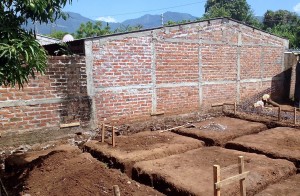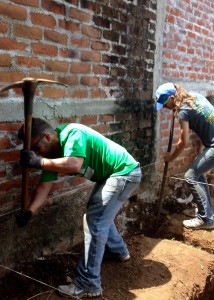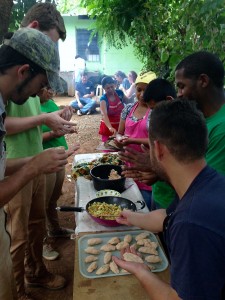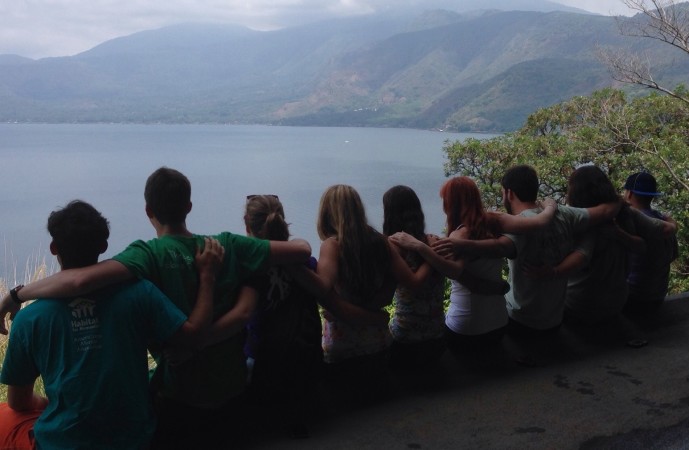El Salvador is a place with over 300 rivers – a country of mountains, volcanoes, expansive forests, and coastal plains.
Yet, its beauty belies an ugly truth of an impoverished country. People live in houses that are no more than shacks, with holes in the roofs that let rain leak in. Other homes have no locks, meaning people must stay home to guard against thieves.
“There are security guards everywhere,” student Brooke Dunham says. “There are bars on all windows and garages and many buildings or houses are elevated on cinder block walls. There are barbed wire fences or glass shards on top of buildings.”
Dunham was among a cadre of UNC Charlotte students who this summer worked alongside homeowners and local masons in Ahuachapán, El Salvador to address this problem. They built the foundation for new homes, while learning about the families’ culture and lives.
Contributions from donors covered their expenses and made the program possible.
Led by Scott Fitzgerald, associate professor, associate chair and director of Graduate Studies in the Department of Sociology and Sean Langley of the Dean of Students Office, this program is a collaboration between the UNC Charlotte Habitat for Humanity Campus Chapter, the local Charlotte affiliate of HFH, and HFH El Salvador.
On average, a single-family ho me in El Salvador costs about $7,000 to build. Modest by American standards, the home consists of two to three rooms with simple electrical and plumbing systems. For families earning only $6.25 to $25 a day, this is a home of infinite value and opportunity. Each house allows families to move out of mud, cardboard, or tin shanties and into decent, affordable homes that are built to keep them safe during El Salvador’s frequent earthquakes and inclement weather.
me in El Salvador costs about $7,000 to build. Modest by American standards, the home consists of two to three rooms with simple electrical and plumbing systems. For families earning only $6.25 to $25 a day, this is a home of infinite value and opportunity. Each house allows families to move out of mud, cardboard, or tin shanties and into decent, affordable homes that are built to keep them safe during El Salvador’s frequent earthquakes and inclement weather.
At the work site, the UNC Charlotte students shared the limited tools – one hammer, one bolt cutter, three pliers and a handful of shovels, pick axes, and wheelbarrows. They adapted, using their hands and crafting crude tools, such as large branches to drive sticks for workbenches in the Central American soil.
“In El Salvador you can hire a laborer for five dollars a day, which makes labor there extremely cheap,” says John Elliot, a student Habitat chapter  member. “The reason more machinery is not used in construction applications is simply because it is cheaper to use human labor than it is to even rent the machinery to do the same jobs.”
member. “The reason more machinery is not used in construction applications is simply because it is cheaper to use human labor than it is to even rent the machinery to do the same jobs.”
The program integrated the hands-on experience building affordable housing with academic course content designed to develop deep understanding of complex social problems.
Students describe a shared vision of changing the world and of working at a more personal level to improve individual lives – including their own.
“I feel like my life has been changed and I have become a better person with a better understanding of the world,” psychology major Hannah Stafford says. “El Salvador and my newly found passion for service both have my heart.”
Another UNC Charlotte student echoes Stafford’s sentiments.
“The culture shock, along with the difference in way of living, was a lot more impactful than I expected,” Alec Newell says. “I was warned to be ready for the culture shock, but I always brushed it off, thinking ‘how much different can it actually be in El Salvador?’ Just being there was eye-opening and very humbling.’
Some say this realization and transformational aspect is an underlying goal.
 “One of the most important things when studying abroad is providing opportunities to learn about yourself and others, a lesson that can also be traced back to my first Habitat trip,” Fitzgerald says. “Helping students learn how to be self-reflective global citizens is an essential part of a liberal arts education, and international travel is one of the best ways to understand how our lives are profoundly shaped by the society and culture that we live in.”
“One of the most important things when studying abroad is providing opportunities to learn about yourself and others, a lesson that can also be traced back to my first Habitat trip,” Fitzgerald says. “Helping students learn how to be self-reflective global citizens is an essential part of a liberal arts education, and international travel is one of the best ways to understand how our lives are profoundly shaped by the society and culture that we live in.”
Service and diverse experiences opened students’ minds to these lessons, says Fitzgerald, who also is campus chapter advisor for Habitat. In addition to their work with the families, the students also visited museums and sites dedicated to Archbishop Oscar Romero, whose tireless work with the poor of El Salvador and commitment to speaking truth to power led to his assassination in 1980. They joined village women for a market expedition and cooking class; toured a coffee production facility; visited Mayan ruins; hiked to the top of a dormant volcano; and played a community soccer game with local children.
This was the first international build sponsored by UNC Charlotte but will not be the last. The program will be offered again in 2016 as a 3-credit hour service-learning course that connects the sociological study of religion and social justice with the student’s work and travel experiences in El Salvador.
Words: Stewart Shelton. Images: Courtesy of Scott Fitzgerald








